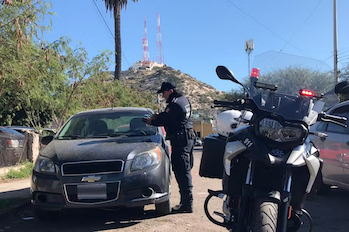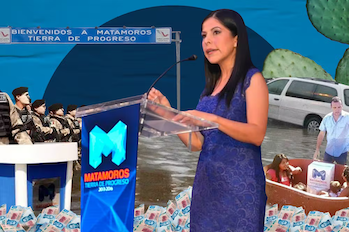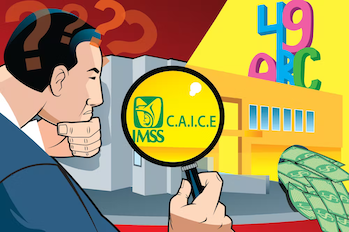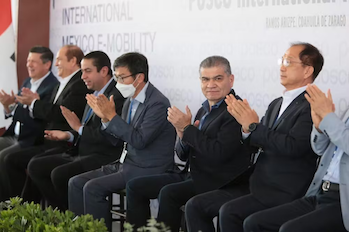
This five-year program run by the International Center for Journalists (ICFJ) aims to deter corruption, support transparency and accountability in Mexico by bolstering journalists’ investigative reporting skills.
The Mexico Border Hub project is building the capacity of journalists and civil society actors to report corruption in seven states (Chihuahua, Coahuila, Nuevo León, Sonora, Baja California, Baja California Sur, and Tamaulipas). The program empowers local journalists, editors, and civil society actors to produce evidence-based investigations on corruption in Mexico. As part of the program, participants are trained and mentored on access to information laws, requesting data on public spending, contracting and procurement procedures, and collaborating with other journalists across state lines. Journalists also learn about data journalism, leveraging technology for investigations and storytelling, as well as digital and physical security protocols.
After the investigations are published, civil society partners develop policy recommendations and advocacy strategies responding to the findings of the stories. In addition, the program supports Mexico’s independent media ecosystem and incentivizes independent media organizations to develop sustainable business models that analyze their audiences, increase the reach of publications, and find alternative revenue streams. This project aims to develop a network of journalists, editors, independent media outlets, and civil society actors willing to collectively fight corruption and improve transparency and accountability in Mexico.
Border Hub Stories with Impact:
- Exposing Corruption in the National Scholarship Program: In 2020, the Border Hub mentored a group of young reporters from El Norte newspaper who participated in the fellowship program and published a series of anti-corruption investigative reports that have begun to have an impact. The first story focused on corruption in the President Andres Manuel Lopez Obrador’s youth scholarship program. After the story was published, the two individuals identified as keeping scholarship funds are now under federal investigation for the misallocation of funds. The municipal government also suspended the operations of the two companies identified in the story. In addition, Mexico’s Senate Majority Leader (Ricardo Monreal) requested that the executive branch make changes in the scholarship program to prevent a replication of the corruption schemes identified in the investigation. Finally, the National Auditor’s office confirmed the investigation's conclusions that there were cases of fraud and theft of funds in the federal scholarship program.
- Reporting on Mexico’s Shell Companies: The same team of young reporters also published four stories exposing a multistate network of shell companies used to siphon off funds from public contracts. The Inicitaiva Sinaloa – another partner in this project – used the findings of the investigative series to file an administrative lawsuit designed to hold these companies accountable. The lawsuit led Mexico’s national tax authorities to open investigations on how the state governments of Nuevo León, Tamaulipas and Coahuila utilize public funds.
- Holding Government Officials Accountable: In 2019, freelance reporter Alán Aviña joined the first cohort Border Hub fellows that received personalized training and mentorship as he investigated the Hermosillo government’s response to a fire that resulted in the tragic death of 49 children. According to Alán Aviña’s article, Marcela Fimbres Ibarra – administrator of the Emergency Attention Center for Special Heath Cases (CAICE) – hired three family members to supply overpriced medicines that went to the survivors of the fire. The anti-corruption report revealed how the public official siphoned off 10 million pesos (around $500,000) as the state responded to the ABC Nursery fire. After the publication, the Iniciativa Sinaloa filed a civil lawsuit to hold the public officials accountable. As a result, the internal review board of the Mexican Institute of Social Services (IMSS) barred Ms. Fimbres Ibarra from public office for the next 12 years. Unfortunately, the journalist Alán Aviña did not see the impact of his investigation because he passed away from Covid-19 in December 2020.
- In 2020, independent reporter Gabriela Medina – who participated in a Border Center training workshop, an online investigative journalism course, and the fellowship program – published an anti-corruption story that revealed how Hermosillo’s police officers were handing out traffic fines to citizens that had not violated the law. The reporter researched complaints posted online, interviewed victims, and found out that citizens regularly encountered records of outstanding debts when they tried to renew their vehicle’s registration at the local municipality. In addition, most citizens were also not able to contest the fines after five days and had to work with the municipality to pay these debts. In an interview with the police chief in charge of traffic fines, the reporter also discovered that officers had to meet a quota of fines per month. As a result of the investigative process, the police chief began to make immediate changes including digitizing the process and requiring officers to submit evidence of violations. Furthermore, the head of police promised to also develop a system where citizens would be able to report abuse practices from police officers. This story was simultaneously published in 14 Mexican media outlets, it included a short video summary of the findings and generated local media interviews with the reporter and leader of the local police department.
- Semanario Vanguardia Organizational Grants: This grant supported the redevelopment of a long running weekly publication so that it would be dedicated to long-form journalism covering public interest stories, as well as investigative reports. The grant was also designed to expand the readership and reach of the media outlet. With ICFJ’s support, the media outlet hired a graphic design expert for the re-launch of the product with some of the additional support. In addition, the Border Center mentored editors on how to simultaneously run daily news stories while developing content for the weekly publication. The media outlet also changed management practices, hired an editor, and adapted best practices from the Border Center’s investigative story editorial process. As a result, Vanguardia relaunched Semanario Vanguardia and published 43 stories including 16 investigative reports that contained appealing illustrations, interactive graphics, and short video documentaries summarizing the main points of each story. Vanguardia’s developed a newsletter with 11,819 subscribers and its audience increased to 133,314 readers, including 43,193 unique visitors. In addition, a short video produced reached over 989,735 viewers with the content of a story of a cave that shows evidence of human life during prehistoric time. The Interamerican Press Association recognized Vanguardia’s team for the photojournalism report documenting Hatian migration at the U.S. border. Finally, a Mexcian civil society organization also awarded Vanguardia’s team a second place recognition for a report on torture.
- 2020 Sustainability Grant: Since the support of SembraMedia takes time to show results and impact, the organization stayed in touch with the first-year grantees providing additional consulting advice and tracking new progress. By the end of 2021 Verificado.com.mx showed a significant increase in content viewership with 3,636,015 visitors, a 1,139 percent increase from the prior year. The media group has established itself as a fact-checking leader in Mexico and is earning new revenue from its consulting and fact checking school services. In addition, La Verdad de Ciudad Juárez grew website traffic to 725,801 page views, a 40.7 percent increase from the prior year. In addition, Verificado.mx content agency has several new clients, and the group was also awarded $10,000 from the Google News Initiative’s Latin America business accelerator program.
- 2021 Sustainability Grant: As part of seeking alternative revenue streams, the Radar BC and RedesPoder began to redesign their websites, sought out ways to increase online ad sales, and implemented search engine optimization strategies to better position their content online. Since journalists tend to prioritize news developments over administrative, management, and financial tasks, SembraMedia also worked with each team to develop personnel and financial management plans. As a result, both media outlets launched content agencies that will provide clients with communications strategy services including website design, content branding, and social media strategies. Radar BC developed a media kit that outlines the services that Radar Studios will provide to future clients. RedesPoder also launched its content agency, attracted two new clients, and developed a training workshop package as part of the services it will provide.














